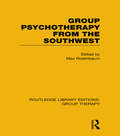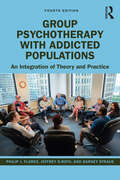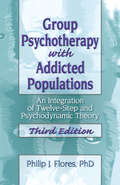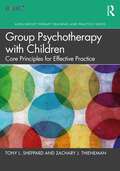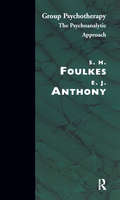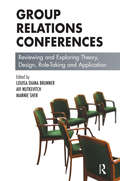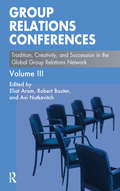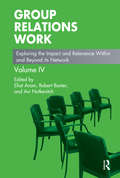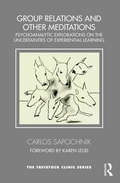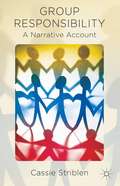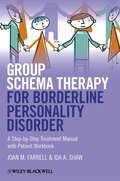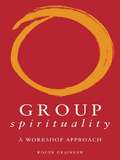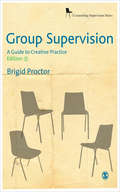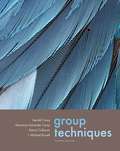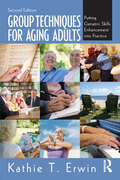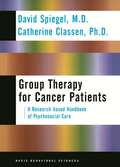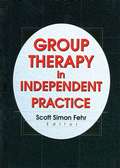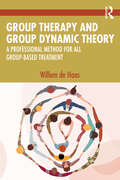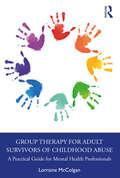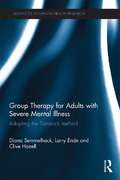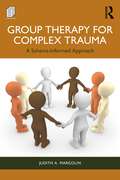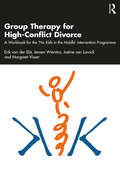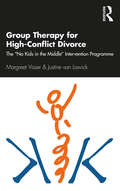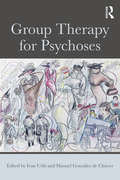- Table View
- List View
Group Psychotherapy from the Southwest (Routledge Library Editions: Group Therapy)
by Max RosenbaumOriginally published in 1974, the Southwest in the title refers to that region of the USA where a community of therapists grew out of the Southwestern Group Psychotherapy Society, founded in Texas 1956, a regional arm of the American Group Psychotherapy Association (AGPA). The chapters cover a range of issues from therapists working in this region and were presented as a tribute to the memory of Dr William Sterling Bell, who took an active interest in group psychotherapy from its early beginnings.
Group Psychotherapy with Addicted Populations: An Integration of Theory and Practice
by Philip J. Flores Jeffrey Roth Barney StrausThis newly updated and streamlined edition of Group Psychotherapy with Addicted Populations provides proven strategies for combating alcohol and drug addiction through group psychotherapy. The interventions discussed in the book build on a foundation of addiction as an attachment disorder rooted in the understanding of addiction as a family disease. An appreciation of group and organizational dynamics is used to address the complex experience of developmental trauma that underlies addiction. Having identified the essential theoretical underpinnings of supporting recovery from addiction in Part One, the second half of the book gives a thorough nuts and bolts description of constructing a psychotherapy group and engaging productively in the successive phases of its development from initiation of treatment to termination. The book concludes with specific recommendations for group psychotherapists to increase their competence with groups, deepen their appreciation of group and organizational dynamics and develop a community of support for their own well-being. These methods are important for psychotherapists working with addicted populations who are inexperienced with group psychotherapy as well as seasoned group psychotherapists wishing to enhance their work.
Group Psychotherapy with Addicted Populations: An Integration of Twelve-Step and Psychodynamic Theory (Third Edition)
by Phillip J FloresBe more effective in group therapy with addicted clients Group Psychotherapy with Addicted Populations: An Integration of Twelve-Step and Psychodynamic Theory, Third Edition is the newly revised edition of the classic text, that provides you with proven strategies for defeating alcohol and drug addiction through group psychotherapy. Philip J. Flores, a highly regarded expert in the treatment of alcoholism and in group psychotherapy brings together practical applications of 12-step programs and psychodynamic groups. This updated book explores the latest in constructive benefits of group therapy to chemically dependent individuals, providing opportunities to share and identify with others who are going through similar problems, to understand their own attitudes about addiction by confronting similar attitudes in others, and to learn to communicate their needs and feelings more directly. Topics in Group Psychotherapy with Addicted Populations: An Integration of Twelve-Step and Psychodynamic Theory, Third Edition include: alcoholism, addiction, and psychodynamic theories of addiction alcoholics anonymous and group psychotherapy use of confrontational techniques in the group inpatient group psychotherapy characteristics of the leader transference in the group resistance in groups preparing the chemically dependent person for group the curative process in group therapy integrating a modern analytic approach a discussion of object relations theory group psychotherapy, AA, and twelve-step programs diagnosis and addiction treatment treatment issues at early, middle, and late stages of treatment a discussion of guidelines and priorities for group leaders countertransference special considerations of resistance to addiction termination of treatment Professionals working in group therapy and addictions will find Group Psychotherapy with Addicted Populations: An Integration of Twelve-Step and Psychodynamic Theory, Third Edition an invaluable resource emphasizing the positive and constructive opportunities group psychotherapy brings to the chemically dependent individual.
Group Psychotherapy with Children: Core Principles for Effective Practice (AGPA Group Therapy Training and Practice Series)
by Tony L. Sheppard Zachary J. ThienemanThis book guides the reader through the process of creating evidence-based therapy groups for children. Introducing an interpersonal theoretical framework that maximizes the interactional and experiential learning and growth components of groups with children, this curriculum offers the child group therapist a theoretical foundation that gives structure to existing techniques and an approach that is multiculturally sensitive and grounded in brain science. A deeper understanding of the mechanisms of change that operate in children’s groups is central to the theme, including an emphasis on play and "learning by doing" through real-life clinical examples which permit readers of all levels to achieve a better understanding of how child groups function. Readers of this book will come away with a deeper understanding of the "power cell" of group therapy: Working interpersonally in the here and now, specifically with children.
Group Psychotherapy: The Psychoanalytic Approach (Pelican Ser.)
by E.J. AnthonyThis classic work attempts to present a comprehensive account for the lay reader of the principles and methods of group psychotherapy.
Group Radical Openness: An Intervention for Overcontrol
by Richard Booth Rachel EganThis innovative book introduces Group Radical Openness (GRO), a group treatment for individuals who struggle with costly and harmful overcontrol. The book opens with the background and evolution of GRO, followed by a thorough description of how to assess overcontrol. This novel group approach draws on both Group Therapy and Polyvagal Theory and encourages an entirely different way of working with this client group. It explores the concept of overcontrol, describing a pattern of distance in relationships, rigidity, and emotional inhibition. The 27-session group treatment leads the participants on a journey where they develop trust and safety with each other, show flexibility, and become more emotionally aware and expressive. Chapters feature engaging clinical examples and strikingly original exercises. This book is aimed at clinicians looking for ways to effectively treat disorders characterised by excessive self-control, such as mood disorders, eating disorders, and certain personality disorders. This will be an important resource in a wide range of mental health and forensic settings.
Group Relations Conferences: Reviewing and Exploring Theory, Design, Role-Taking and Application (The Group Relations Conferences Series)
by Louisa D. BrunnerThis book reflects the culture of the Belgirate Conference, namely combining traditional and experiential modes of developing new ideas and knowledge; and in order to further the field of Group Relations. It contains the collection of papers presented at the conference plus two additional papers.
Group Relations Conferences: Tradition, Creativity, and Succession in the Global Group Relations Network (The Group Relations Conferences Series)
by Eliat Aram Robert Baxter Avi NutkevitchThis book, the third in a series based on the Belgirate conferences, deals with the personal as well as the organisational journeys of Group Relations practitioners and examines these through the lens of tradition, succession and creative application.
Group Relations Work: Exploring the Impact and Relevance Within and Beyond its Network (The Group Relations Conferences Series)
by Eliat AramGroup Relations Work: Exploring its Impact and Relevance Within and Beyond its Network is composed of the presentations given at Belgirate IV, as well as some post conference reflections. The various chapters touch on the current flow of Group Relations as a discipline, as a method of work being applied and studied in Group Relations Conferences worldwide and in organizations, training programs, and in the understanding of social phenomena.The various chapters, while describing, articulating, exploring and conceptualizing theoretical and practical issues, are also opening various questions associated with Group Relations for further thinking and exploration. As such, this book reflects a chain at a certain point in time in the continuous practice and development of Group Relations as a discipline and a method of work.
Group Relations and Other Meditations: Psychoanalytic explorations on the uncertainties of experiential learning (Tavistock Clinic Series)
by Carlos SapochnikThis book examines the Tavistock tradition of using group relations conferences as temporary training organizations for groups and institutions, and how those can inform and enrich the theory and practice of experiential learning more generally. First, this book analyses the structures, rituals, and beliefs of group relations conferences, drawing on the author’s learned experience in the field, followed by meditations extending to broader areas, such as the social nature of corruption, martial arts, Western culture’s longing for creativity, and the use of drawing in social science research. It addresses the tension between psychoanalysis and systemic theory in group relations thinking, refining and re-defining key concepts of the practice, challenging notions of dependence and dependency, performative poetics, learning, the politics of power, nostalgia, and the unspoken reasons for the wish to join conference staff teams. It offers a critique of the polarity concerning terms such as spontaneity, the sense of mystery, openness to the unexpected, and trust in unconscious processes, as opposed to the desire for certainty and the confusion, anxiety, and aggression evoked when groups find themselves without familiar signposts. Drawing on his thinking developed over the course of a professional life as organizational consultant, artist, designer, teacher, researcher, and poet, the author invites the reader to challenge boundaries towards a less inflexible and defended engagement with the Other. The metaphor of bricolage, an activity that inspires creativity and originality, suggests possible ways of putting known things together to approach new meaning as provisional and shifting. The many strands thus gathered reveal new dimensions of group life that crucially affect our everyday living and surviving, both as individuals and as members of society. This work will allow psychoanalysts, psychotherapists, group therapists, organizational consultants and trainers to put the lessons learned from group relations conferences into everyday practice.
Group Responsibility
by Cassie StriblenDrawing on work in social psychology, narrative ethics, and feminist philosophy, the author presents a new account which answers the standard objections while also giving practical guidance to individuals who take their group-related responsibilities seriously.
Group Schema Therapy for Borderline Personality Disorder
by Ida A. Shaw Joan M. FarrellGroup Schema Therapy for Borderline Personality Disorder represents the first treatment manual for group schema therapy and is based on the only group ST model validated by published empirical evidence. Presents an original adaptation of schema therapy for use in a group setting Provides a detailed manual and patient materials in a user-friendly format Represents a cost-effective ST alternative with the potential to assist in the public health problem of making evidence-based BPD treatment widely available Includes 'guest' chapters from international ST experts Jeff Young, Arnoud Arntz, Hannie van Genderen, George Lockwood, Poul Perris, Neele Reiss, Heather Fretwell and Michiel van Vreeswijk
Group Spirituality: A Workshop Approach
by Roger GraingerGroup spirituality is an increasingly popular area of focus, and working in groups raises some very different and valuable consequences which wouldn't necessarily arise in a one-to-one encounter. In Group Spirituality, Roger Grainger, an author already established as an authority on Drama therapy, provides a functional guide to group spirituality and workshops. Derived from the authors' experiences of working with groups of people interested in exploring their own and other people's spirituality, Group Spirituality turns an abstract idea into a practical and recognizable experience. The nature of group work, the embodiment of ideas and feelings, and circumstances aiding personal encounter are discussed. Workshop examples aimed at establishing group identity and the introduction of the idea of the 'safe place' are explained. The symbolism of spiritual awareness is approached, and a firm distinction between spirituality and religion is made. Group Spirituality's approach to spirituality from a workshop focus, successfully attempts to embody spirituality and provide a framework for consciously examining and integrating spirituality within the rest of our life.
Group Supervision: A Guide to Creative Practice (Counselling Supervision series)
by Ms Brigid Proctor`The Second Edition of Group Supervision is essential reading for all participants in group supervision. It offers a comprehensive insight into the complexities of organising, managing and creatively facilitating a group or of being a practitioner in a cooperative peer group' - Professor Sue Wheeler University of Leicester Among the plethora of supervision books, Group Supervision is the only one dedicated to group work. Brigid Proctor shows how group supervision can provide a supportive environment in which practitioners learn from each others' experience, finding positive and creative ways of working with the diversity which characterises all groups. Examining tasks, roles and responsibilities of both supervisors and supervisees, she describes the skills needed for: " managing different types of group, " developing a flexible leadership style " making sense of group and individual needs " using creative methods. The Second Edition of this popular text features up-to-date research findings on group supervision in organisations and further coverage of the challenge of ethical decision-making in groups. A new chapter considers the advantages of groups for supervisor development and training, stressing the urgency for greater accountability and research. Essential for all supervisors and trainers, the practical information in this book will also benefit those who manage organizations providing group supervision for counsellors and psychotherapists- be they employees, volunteers or trainees. Brigid Proctor, Fellow of the BACP, is a retired Director of Counselling courses at South West London College and has subsequently worked freelance as a counsellor, supervisor, trainer and consultant.
Group Techniques
by Gerald Corey Marianne Schneider Corey Patrick Callanan J. Michael RussellMore than a recipe book of techniques that group leaders can pull out at the right time, this book encourages readers to use techniques sensitively and creatively in their own groups, and to go one step further to invent their own techniques. The authors draw on their combined experiences as teachers, as consultants to mental-health professionals, and as private practitioners to provide a realistic approach to group work. Emphasizing that techniques are means, not ends, the book is designed to enhance the group leader's ability to generate a therapeutic and human rapport between leader and members.
Group Techniques for Aging Adults: Putting Geriatric Skills Enhancement into Practice
by Kathie T. ErwinElders can struggle with issues of social isolation and self-esteem, and benefit from having positive coping skills at their disposal. The practical ideas Kathie Erwin imparts in this second edition help mental health professionals working with elderly populations to create an interactive, multi-modal program that addresses the issues and needs elders have. The group modalities are defined in holistic contexts of mind, body, society, and spirituality. Among the group modalities are reminiscence, bibliotherapy, remotivation, humor, expressive art, and therapeutic writing and sacred spaces, which are new to this edition. Mental health professionals appreciate the practical and detailed guidelines for how to design, implement, and monitor progress for various types of group modalities that allow them to put theory into practice easily. Their elder clients will benefit from the methods they develop in group to deal with problems such as isolation and reduced social networks.
Group Therapy For Cancer Patients: A Research-Based Handbook of Psychosocial Care
by Catherine Classen David SpiegelThis extraordinary resource celebrates and expands on Dr. David Spiegel's discovery that a shared intimacy with mortality creates very different concerns in the patient from those that apply in conventional settings. <P><P>Spiegel and Classen introduce mental health professionals to the awareness as well as the tools they will need to facilitate groups coping with existential crises. The result is a model for helping that actually helps.
Group Therapy In Independent Practice
by Scott Simon FehrLearn effective techniques that will enhance your group therapy practice or educational program!Group Therapy in Independent Practice, written by seasoned clinicians, presents discussion on a wide spectrum of related issues that will help therapists to effectively handle group situations. Within its pages you will find proven and effective strategies that also examine group therapy as a whole, group therapy practices in Israel, and how you can use the Internet to enhance your professional practice. In addition to being an invaluable guide for practicing therapists, Group Therapy in Independent Practice is of particular interest for classroom use. The topics explored in relation to group therapy are diverse, covering the age range from adolescence to geriatrics. There is a focus on issues of intimacy and anger which are often two of the more difficult experiences for novice clinicians to effectively deal with in the beginning of their careers. There is also a very interesting chapter which explains the practice of group therapy in another country, lending a cross-cultural perspective to the work.Some of the areas that Group Therapy in Independent Practice will increase your expertise in are: personality disorders intimacy issues bereavement issues identity development in ADHD adolescents anger issues group dynamics internet resources for therapistsGroup Therapy in Independent Practice brings to light the profound influence that this continuing and rapidly growing force in psychotherapy has on personality change, in America and around the world. It is a vital tool to make you more effective as a group leader.
Group Therapy and Group Dynamic Theory: A Professional Method for all Group-Based Treatment
by Willem de HaasGroup Therapy and Group Dynamic Theory offers an innovative approach to group therapy with an integrated and highly practical method. It is written for all group therapists. The book offers a solid base for professionals practicing group psychotherapy and for professionals working with structured, educational, or training-oriented therapy groups.The method discussed in this book is based on the core knowledge about groups: group dynamic theory. This theory is used to clarify the variety of group processes and is translated into practical techniques to highlight the benefits of these processes within group therapy. Each chapter contains concrete interventions, skill labs, and a practical manual where corresponding techniques are further demonstrated with lively examples and practical exercises. The book concludes with a troubleshooting guide to offer solutions to complex problems group therapists may encounter.Group Therapy and Group Dynamic Theory is the translation of a best-selling book about group therapy in the Netherlands. It is in line with the Dutch and American Practice Guidelines for Group Psychotherapy and is used in the official group therapy training in the Netherlands.
Group Therapy for Adult Survivors of Childhood Abuse: A Practical Guide for Mental Health Professionals
by Lorraine McColganThis book presents the therapist with a reflective and robust framework for group treatment that promotes an end to the shame and secrecy so frequently experienced by survivors. Through a series of tools such as visualisations and art exercises, the practitioner is guided through the process of establishing and running a group in this modality. The synthesis of both an educational and a process-based model is imbued with a sense of warmth and a deep understanding of this client group. Themes such as self-soothing, strengthening boundaries, inner-child work, making meaning of endings, and ways forward drive this therapeutic approach. Taking group work as the optimum matrix for change for this client population, this model provides a convincing rationale for the establishment of said work as best practice in the institutions that provide for their care. Practicing therapists and mental health nurses will find this new model of therapy an instrumental resource in their approach to treatment for survivors of trauma and abuse.
Group Therapy for Adults with Severe Mental Illness: Adapting the Tavistock method (Advances in Mental Health Research)
by Clive Hazell Larry Ende Diana SemmelhackMental illness is prevalent in society with a quarter of individuals having a diagnosable mental illness. A growing percentage of these individuals develop severe disorders which incapacitate them and may leave them unemployed, lonely, isolated and untreated. In recent years, there has been a movement away from therapy, and a heightened emphasis on medicalization. This book argues that medication alone does not take away the deep emotional pain of feeling isolated and lonely, and considers the modification of the client’s social relationships as a critical ingredient in any treatment. Group Therapy for Adults with Severe Mental Illness explores a non-traditional application of treatment known as the group-as-a-whole model. This approach to group work derives from the Tavistock tradition, in which emphasis on the whole group versus any specific member makes the group a safe place to risk sharing and confronting painful issues. This text highlights the efficacy of utilizing this model in the treatment of severely mentally ill consumers in various settings including jails, nursing homes and group homes. Included in the book: -case studies using the Tavistock method-the power of group-as-a-whole work in educating mental health professionals and graduate students-the use of the model to enhance creative expression in the arts-the use of the model to understand larger social systems This text will be of value to mental health professionals, researchers and educators interested in the treatment of severely mentally ill populations in institutional settings, and individuals with a specific interest in group psychotherapy.
Group Therapy for Complex Trauma: A Schema-Informed Approach
by Judith A. MargolinGroup Therapy for Complex Trauma provides a roadmap for professionals trying to address the many issues that arise in group treatment. It’s an excellent training resource for mental health professionals working in institutions that provide higher levels of acute care, including inpatient, partial hospitalization, and/or intensive outpatient programs, as well as those running groups in traditional outpatient settings.Chapters pull the most recent theory and practice into one concise resource, addressing not only how to treat complex trauma but also why doing so matters. They also provide guidance for troubleshooting situations that often arise around when conducting groups with a population that is often highly dysregulated. The second section includes exercises, and handouts that can be reproduced and shared with participants, enabling them to follow along during the group session and to complete exercises and review material in their own time.
Group Therapy for High-Conflict Divorce: A Workbook for the 'No Kids in the Middle' Intervention Programme
by Margreet Visser Justine van Lawick Erik van der Elst Jeroen WierstraGroup Therapy for High-Conflict Divorce: A Workbook for the 'No Kids in the Middle' Intervention Programme is an essential resource for reframing the divorce process to centre the child. This workbook supports parents and practitioners using the No Kids in the Middle intervention programme, a multi-family approach for high-conflict divorce that aims to reduce psychosocial adjustment problems among children. Bridging the gap between therapy sessions and daily life, it offers exercises, testimonials and tips to stimulate parents to reflect on their own behaviour from a child’s perspective. Alongside the core text Group Therapy for High-Conflict Divorce (2021), this will be a vital tool in a mediation process that aims to identify and end destructive patterns, to increase acceptance and to establish parenting plans to ensure the wellbeing of children. This book will be of interest to parents going through divorce as well as to social workers and family therapists who are looking for practical guidance to support their clients. The variety of tools contained in this workbook supplement Group Therapy for High-Conflict Divorce and will aid those working through the No Kids in the Middle programme.
Group Therapy for High-Conflict Divorce: The ‘No Kids in the Middle’ Intervention Programme
by Margreet Visser Justine van LawickThe "No Kids in the Middle" (Kinderen uit de Knel) intervention programme addresses high-conflict divorce through a multi-family approach. This first English language edition contains descriptions of the therapeutic sessions, references to a homework book (van der Est et al., in press) for parents and their network, along with extra information about the theoretical foundations of the programme. The book starts with theoretical foundations and a summary of the scientific research behind the methodology before moving on to focus on the methodology of the intervention programme per session, with detailed descriptions of each therapeutic session. Through these session descriptions, the authors demonstrate how the theory of the methodology can be put into practice within a group setting. The methodology is also conveyed in such a way that the key pillars and themes are clear, with a best-practice framework clearly demonstrated. Yet at the same time, the authors leave room for customization depending on the actual clients and therapists, and for this framework to be built upon further. With this programme now practiced and studied throughout Europe, Group Therapy for High-Conflict Divorce and it’s methodology will act as a living framework to help continuously improve practice and research among professional therapists, while also appealing to social workers and legal professionals.
Group Therapy for Psychoses
by Ivan Urlić Manuel Gonzalez De ChavezGroup therapy for patients with psychotic experiences is one of the least known of the group therapies; it is also one of the most diverse. This collection presents a range of methods, models and settings for group therapy for psychoses, as well as exploring the context for this type of treatment. Group Therapy for Psychoses offers an international perspective on the current range of practice in the field, in multiple care situations, contexts and institutions; from acute units to therapeutic communities, rehabilitation groups, self-help, and groups of those who hear voices. Presented in two parts, the first covers the history, evaluation and research methodologies of group therapy, while the second explores specific examples of groups and settings. The book tackles misconceptions about the treatment of psychoses and emphasises the healing effects of group therapy. It underscores the importance of training for selecting and conducting groups of patients suffering from psychoses and suggests possible formats, approaches and perspectives. The book’s wide, reflexive and practical collection of chapters together demonstrate how group therapies can effectively help patients with psychotic experiences to overcome their difficulties on their way to recovery. The book will be of great use to clinicians working with people suffering from psychosis, including psychiatrists, psychotherapists, psychoanalysts, psychologists, physicians and social workers. It will also appeal to group analysts, family therapists and CBT practitioners, as well as to all researchers in these fields.
